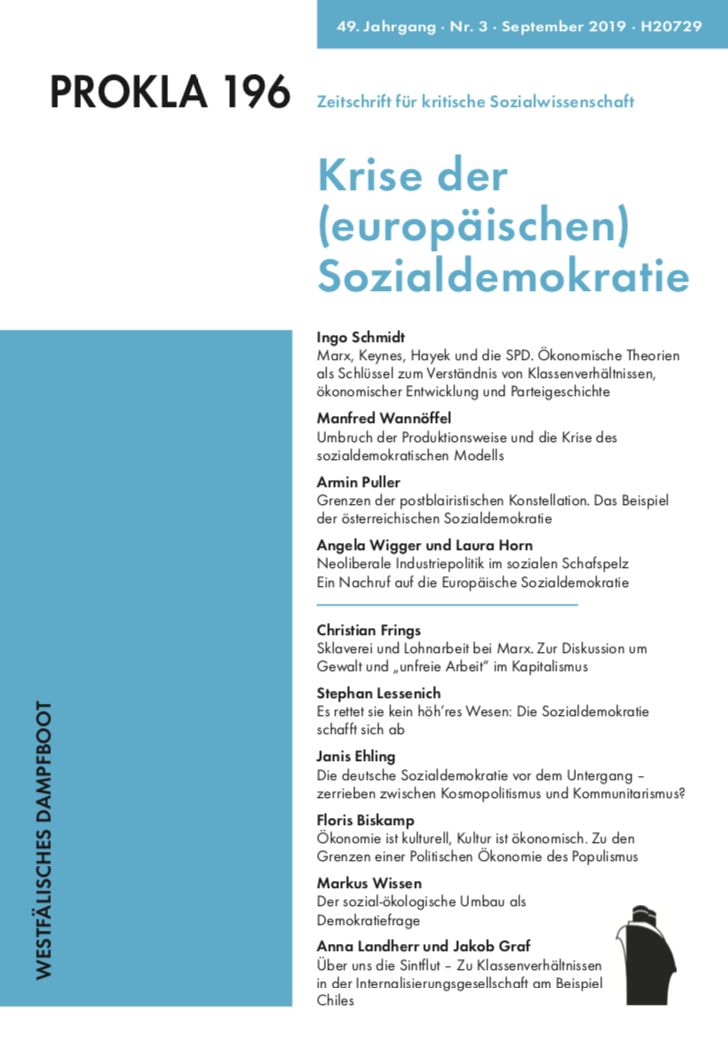Limits of the Post-Blairist Constellation
The case of Austrian Social Democracy
DOI:
https://doi.org/10.32387/prokla.v49i196.1834Keywords:
austria, Blairism, social democracy, third wayAbstract
The article analyses the current situation of social democracy from the perspective of political strategy and explicates the development of Austrian social democracy (SPÖ). According to this theoretical problematic, the emergence of Blairism is not conceived as the mere result of exogenous processes weakening traditional social democracy’s identity but as an attempt to unite social democratic parties behind a party project capable of resolving the crisis of the 1980s and 1990s and allowing party leaderships tactical flexibility and room for manoeuvre. After the defeat of Blairism, social democratic parties initiated a renewal in the direction of post-Blairism. It combined core elements of Blairism with vague references to social justice and ambivalent approaches to reconnect to the working class. As with Blairism, post-Blairism proved to be incapable of establishing ideological coherence nor intra-party stability. Although being a double exceptional case of the transition from Blairismus to post-Blairism (connected to a displaced dynamic of Austria’s political economy), these are problems also characterising the development of the SPÖ.
Downloads
References
Alemann, Ulrich von (1999): Der Wahlsieg der SPD von 1998. In: Niedermayer, Oskar (Hg.): Die Parteien nach der Bundestagswahl 1998. Opladen: 37-62.
− /Spier, Tim (2011): Die SPD nach der Bundestagswahl 2009. In: Niedermayer, Oskar (Hg.): Die Parteien nach der Bundestagswahl 2009. Opladen: 57-77.
Bailey, David J. (2009): The Political Economy of European Social Democracy. A critical realist approach. London.
Becker, Joachim (2000): Verspätung und Avantgardismus. Zur politischen Ökonomie des gesellschaftlichen Umbruchs in Österreichs. In: Kurswechsel 4/2000: 95-109.
Brand, Ulrich (2019): Eine Sozialismusdebatte ist dringend geboten. URL: http://www.derstandard.at/story/2000102985019/eine-sozialismusdebatte-ist-dringend-geboten, Zugriff: 23.6.2019.
Butterwegge, Christoph (2015): Hartz IV und die Folgen. Weinheim.
Dahrendorf, Ralf (1983): Die Chance der Krise. Über die Zukunft des Liberalismus. Stuttgart.
Evans, Geoffrey/Tilley, James (2017): The New Politics of Class. The Political Exclusion of the British Working Class. Oxford.
Finlayson, Alan (2009): Planning People: The Ideology and Rationality of New Labour. In: Planning, Practice & Research 24(1): 11–22. http://doi.org/10.1080/02697450902742122.
Gallas, Alexander (2016): The Thatcherite Offensive. A Neo-Poulantzasian Analysis. Leiden.
Giddens, Anthony (1998): The Third Way. The Renewal of Social Democracy. Cambridge.
Goes, Eunice (2016): The Labour Party under Ed Miliband. Trying but failing to renew social democracy. Manchester.
Hall, Stuart (2014a): New Labours doppelte Kehrtwende. In: Populismus, Hegemonie, Globalisierung, Ausgewählte Schriften, Bd. 5. Hamburg: 133-146.
− (2014b): „Die soziale Frage soll nicht gestellt werden“. In: Populismus, Hegemonie, Globalisierung, Ausgewählte Schriften, Bd. 5. Hamburg: 166-171.
Hannah, Simon (2018): A Party with Socialists in it. A History of the Labour Left. London.
Jessop, Bob (2018): Bonapartismus ohne Bonaparte. Von Thatcher über Blair zum Brexit. In: Beck, Martin/Stützle, Ingo (Hg.): Die neuen Bonapartisten. Mit Marx den Aufstieg von Trump & Co. verstehen. Berlin: 93-112.
Joyce, Robert/Sibieta, Luke (2013): An assessment of Labour’s record on income inequality and poverty. In: Oxford Review of Economic Policy 29(1): 178-202. http://doi.org/10.1093/oxrep/grt008.
Jones, Owen (2011): Chavs. The Demonisation of the Working Class. London.
Kern, Christian (2016): Europa muss wieder gerechter werden. In: Frankfurter Allgemeine Zeitung, 12.9.2016: 6.
Kitschelt, Herbert (1994): The Transformation of European Social Democracy. Cambridge.
Liegl, Barbara (2006): Die SPÖ. In: Tálos, Emmerich (Hg.): Schwarz-Blau. Eine Bilanz des ‚Neu Regierens‘. Wien: 38-52.
Lösche, Peter (1992): Zur Metamorphose der politischen Parteien in Deutschland. In: Gewerkschaftliche Monatshefte 9/1992: 531-537.
Merkel, Wolfgang (1993): Ende der Sozialdemokratie? Machtressourcen und Regierungspolitik im westeuropäischen Vergleich. Frankfurt/M.
− u.a. (2008): Social Democracy in Power. The Capacity to Reform. London.
Miliband, Ed (2011): The Labour party still has to change (14.1.2011). URL: http://www.theguardian.com/commentisfree/2011/jan/14/labour-oldham-progressives-champion, Zugriff: 23.6.2019.
Moschonas, Gerassimos (2002): In the Name of Social Democracy. The Great Transformation: 1945 to the Present. London.
Mouffe, Chantal (2018): For A Left Populism. London.
Müller, Wolfgang C. (1996): Die Organisation der SPÖ, 1945-1995. In: Ders./Maderthaner, Wolfgang (Hg.): Die Organisation der österreichischen Sozialdemokratie 1889-1995. Wien: 195-356.
Nachtwey, Oliver (2009): Marktsozialdemokratie. Die Transformation von SPD und Labour Party. Wiesbaden.
Nowotny, Thomas (2016): Das Projekt Sozialdemokratie. Innsbruck.
Przeworski, Adam (1985): Capitalism and social democracy. Cambridge.
Puller, Armin (2018): Die ÖVP unter Sebastian Kurz. In: Kurswechsel 3/2018: 9-18.
Sassoon, Donald (2010): One Hundred Years of Socialism. The West European Left in the Twentieth Century. London.
Schneider, Etienne (2017): Raus aus dem Euro – rein in die Abhängigkeit? Hamburg.
Seymour, Richard (2017): Corbyn. The strange rebirth of radical politics. London.
SPÖ (1998): Das Grundsatzprogramm. Wien.
– (2017a): Plan A. Das Programm für Wohlstand, Sicherheit & gute Laune. Wien.
– (2017b): Ziele & Werte für Österreich. Wertekompass der SPÖ. Wien.
– (2018): Grundsatzprogramm. Wien.
Walter, Franz (2010): Vorwärts oder abwärts? Zur Transformation der Sozialdemokratie. Berlin.






